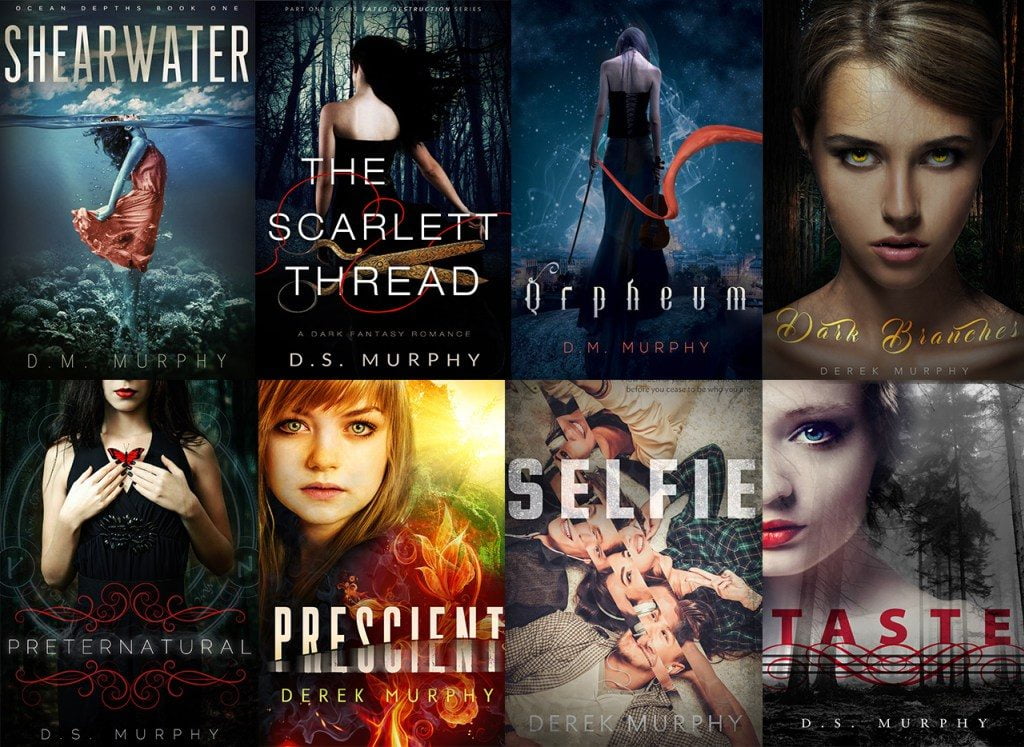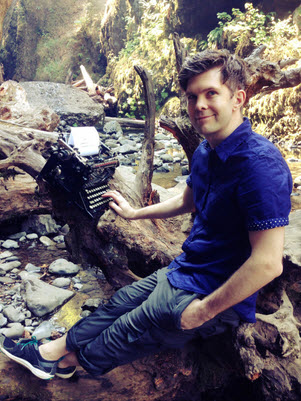Derek Murphy has long been a fascinating indie author to watch – and you never quite know what he's going to do next.,,
An ALLi Professional Member, he comes across as a bit of a Renaissance man and a maverick. He turns his hand to all aspects of self-publishing from providing inspiration to other authors (who else would think of inviting them into a French chateau for NaNoWriMo?), to writing his own fiction and non-fiction, to cover art to book design to marketing.
With enormous energy and focus, he has engineered multiple income streams enabling him to travel the world all year round, writing and creating as he goes.
We're delighted to have been able to pin him down long enough to answer our interview questions today.
1) What is the secret of your success?
I don’t market my books by talking about them or trying to sell them. I build platforms that attract my ideal readers to me; I write content that my audience will share; and I run giveaways to build my list.
I also try to promote or feature other authors in my field or genre as much as possible.
Being a cover designer lets me start out with a great cover (and knowing it’s the right one to sell the book) so that helps.
2) What was the single best thing you ever did?
I think renting a castle for NaNoWriMo tops the list. It let me get featured on Nanowrimo’s blog as well as CNN.
I got some great pictures out of it and built a reputation as someone who can organize amazing writing retreats (something I’d like to do more of in the future).

Derek Murphy (at centre front, in blue) with his NaNoWriMo author friends on the steps of his hired French chateau
3) How do you get/stay in a creative mood?
For me the biggest creativity and productivity killer is the stress of all the things I need to do. I tend to resist the “work” (other people’s projects) and can’t start the “play” (my projects) – which leads to procrastination.
I usually need to do the play first, before I check email or start my list of client projects. I try to structure my time so can wake up slowly, relax a bit and then do creative work (writing) for a few hours, and put off design work until later at night.
Book design is creative in a visual way, but not nearly as mentally taxing as writing fiction.
I also eat boxes and boxes of cookies.
4) How do you prioritise?
I don’t think prioritizing is at my strength. But, I usually pick one thing at a time and work on it for 80% of the day.
If I’m writing fiction, that might be all I do, and I’ll take lots of long breaks to untangle my brain. If I’m behind on design work, I may spend 12 hours in Photoshop.
Many authors have healthier and more balanced daily schedules, I’m an “all or nothing” kind of guy. A few of my books I wrote and published in a month, so I know I’m capable of writing full time and cranking out books… but until I’m making a living with my writing, I still have lots of other projects to work on.
Also, it might be worth mentioning that I published a bunch of story starters to see which was the most popular, before committing to a full series. So now I know which writing projects will generate the most income for me (Shearwater and Scarlet Thread have over 500 reviews combined). I have a dozen series planned that I’m excited about, but I’ll keep testing the market this way before I invest too much time in them. I want to make sure readers are actually interested in the stories I want to tell.

Derek Murphy's current fiction projects
5) What’s next?
My platforms get a lot of traffic but don’t generate much income. I’m going to focus on fixing that soon with better content and some courses on book design, self-publishing and marketing. That will let me finish more fiction – I have four free books out that have gotten over 50,000 downloads, and I have a lot of readers waiting for the conclusions.
I’ll also publish about five more non-fiction books to widen my funnel and introduce more people to my self-publishing resources.
I’ve also started a Facebook group called “Guerrilla Publishing” where I’ll be sharing some of my best book marketing hacks.
6) What’s the highlight of being an author – publisher for you?
For me personally, speed of publishing and direct relationship with readers.
I was going to say “freedom and control” but those are actually two of the most dangerous things for self-publishing authors to have. Most authors have very little experience designing book covers and are likely to make the wrong choices.
The cover is crucial for your book’s success and I have witnessed hundreds of authors stick with a cover that they like even when it’s killing sales, and need to spend 10x more resources and time on book marketing.
I love the freedom and control of publishing, because I can test quickly and fail often. After doing that for ten years, I can design, format and market a book with zero budget and have excellent results.
But for first time-authors, it’s far too easy to make critical mistakes (based on personal preference) without help from someone who knows what will actually sell the book. And unfortunately, many book coaches or small publishers are also not equipped to pick out a winning book cover.
7) What are your top tips for other indie authors?
There are a million things you could learn about self-publishing, but there’s only one that makes a huge difference: most indie authors write for themselves and hope the market will support them. Most successful indie authors write books for popular markets, and they know exactly what kinds of books will sell in those markets.
You can do your art and hope for the best, or you can become an artisan and make things people are willing to pay for.
I prefer to spend my time writing books that a whole bunch of readers will enjoy, and it has the added bonus of earning well.
Some authors prefer to spend time writing the books that they enjoy and what they wish to say to the world. Some of those books might do well, with enough marketing.
But the income you earn from any given book will absolutely be limited by the potential readership of the topic or genre; writing books that have broader potential is a deliberate choice that many authors avoid.
Inspiring interview of super-successful #selfpub #author Derek Murphy aka @Creativindie Share on X





[…] Sunday Success Stories: How I Do It – with Derek Murphy […]
[…] Derek Murphy Inspiring interview with ALLi professional member and innovative authorpreneur Derek Murphy, whose […]